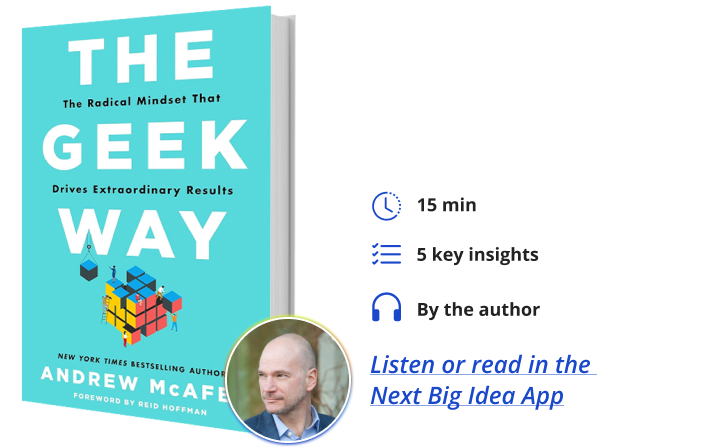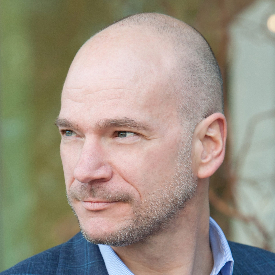Andrew McAfee is a principal research scientist at MIT and co-founder and co-director of MIT’s Initiative on the Digital Economy.
Below, Andrew shares five key insights from his new book, The Geek Way: The Radical Mindset Transforming the Future of Business. Listen to the audio version—read by Andrew himself—in the Next Big Idea App.

1. What makes us so special?
Why are we humans the only species that launches spaceships? It’s not because we’re so smart. We’re actually pretty dumb in important ways. For example, almost none of us are smart enough to figure out on our own how to survive in the wilderness, while all the animals around us are doing just fine.
The “on our own” phrase there is the key one. We humans didn’t evolve to live on our own. Instead, evolution shaped us to be the most social species on the planet. We are the only species that cooperates intensely in huge numbers of unrelated individuals (think of a marching band, an army, or a company).
Evolution also shaped us to be by far the best and fastest teachers and learners on the planet. As a result, our cultures evolve quickly. We went from the first airplane flight to the first space flight in less than 60 years, and from the first space flight to walking on the moon in less than 10 years.
So now we know what makes us so special: large-scale cooperation and super-fast learning. This insight gives us a whole new way to look at doing big, important things like launching spaceships or companies. In particular, it tells us to shift our focus: Think less about individuals and how to make them smarter (or nicer or more ethical or whatever). We need to think a lot more about groups: how to set up their cooperation and maximize their learning. As we’ll see, this is what the geek way does so well.
The geek way is all about the human group and its culture. It’s about activating the cooperation and learning superpowers that evolution gave us while also channeling our many biases.
2. The geek shall inherit the earth.
Here’s a pretty wild statistic: the most valuable seven US public companies are worth more than all the public companies in Japan, China, France, and the UK combined. All seven of them are from small patches of real estate on the West Coast, namely Silicon Valley and the Seattle area.
At the start of this century, 16 of the 100 most valuable companies were headquartered on the West Coast (mostly in those two places). Now, 38 of them are, and they’re responsible for almost 60 percent of the total market value of the top 100.
“A bunch of geeks concentrated on the West Coast have simply figured out a better way to run a company.”
So why is value creation in the 21st century so concentrated? The common answer is that the West Coast is where the US high-tech industry is. But why is that the case? Does the rest of the country just not get it? Do execs in New York not understand that software is eating the world? Have entrepreneurs in Chicago never heard of network effects or Moore’s Law? Of course not. Those explanations don’t make any sense.
My explanation is that a bunch of geeks concentrated on the West Coast have simply figured out a better way to run a company. They’ve iterated and experimented their way into a bundle of practices and philosophies that allow companies to be simultaneously innovative, agile, and excellent at execution.
I call this bundle The Geek Way, and it’s a better way, no matter your industry. Consider a few examples that are far from classic high tech, from the computer hardware and software industries: Netflix has completely disrupted the entertainment industry, SpaceX has done the same for rockets and communications satellites, Tesla has done it for cars, Stripe for online payments, and so on
The big idea is that the geeks have given the company an upgrade—the biggest upgrade since we first figured out how to build large Industrial Era companies about a century ago. Those companies now have to adapt or die. One way or another, the geek way is going to take over for the simple reason that it works better. The geeks are, in fact, going to inherit the earth because they’ve figured out better ways of bringing us weird and wonderful human beings together for cooperation and learning.
3. The science behind science.
Here are two things to always keep in mind about us human beings. The first is that we’re chronically overconfident. We are way more confident in our ideas, judgment, predictions, morals, and ethics than we should be. Why? Because confidence is so important for members of the most social species on the planet. We naturally want to ally ourselves and work with confident people instead of unconfident ones. So evolution has shaped us to be more confident than warranted by reality.
The second thing to keep in mind about us ultrasocial human beings is that we’re naturally reluctant to challenge high-status individuals, the people at the top of the org chart.
Netflix CEO Reed Hastings learned about both these aspects of human nature the hard way in 2011 when he came up with the idea to split his company in two. After the split, there would be Netflix for streaming and “Qwikster” for managing DVD rentals by mail. Hastings was confident that the split was a good idea. It really and truly wasn’t. It was so bad that it got parodied on Saturday Night Live. People started calling him “Greed Hastings” and canceling their subscriptions. Netflix’s market cap shrank by 75 percent in a few months.
After he reversed course and called the whole thing off, Hastings asked his colleagues why he didn’t get more pushback on his terrible, overconfident idea. They found various ways to tell him that they were reluctant to challenge Netflix’s highest-status person.
So how do business geeks address this nasty, common, very human problem? By being scientific. Science is a never-ending argument with two simple ground rules: argue as equals and rely on evidence to settle disputes. Not seniority or charisma or status, but evidence.
“Science is a never-ending argument with two simple ground rules: argue as equals and rely on evidence to settle disputes.”
Science taps into one of our species’ superpowers. Because we’re chronically overconfident, we’re really bad at evaluating our own ideas. But it turns out that we’re really good at evaluating the ideas of others. Science gives us plenty of chances to do just that.
After the Qwikster debacle, Hastings worked hard to establish a norm of science throughout Netflix, to make it a company full of egalitarian, evidence-based debates. Here’s one example of how successful this effort has been. In 2015, Hastings said publicly that adding the capability to download shows to the Netflix app was a waste of time and a bad idea. He thought that only one percent of subscribers would use it.
Todd Yellin and Zach Schendel, two people within the product group, thought Hastings was wrong. Schendel conducted user interviews in three countries and found out that people loved downloading and used it whenever it was available. The lowest usage he found wasn’t one percent—it was 15 percent.
When Yellin and Schendel confronted Hastings with this evidence, he didn’t fire them or dig in his heels. Instead, he followed the great geek norm of science and bowed to the evidence. The Netflix app now has a download feature.
This example illustrates both what the Geek Way is and why it works so well. The Geek Way is about norms, like the norm of science: conducting egalitarian, evidence-based arguments.
The Geek Way works so well because it deals with our human biases—like overconfidence—and activates our superpowers, like accurately evaluating the arguments of others.
4. The need for speed.
Robert E. Lee said, “It is well that war is so terrible, or we should grow too fond of it.” The business geeks feel the same about planning. We humans are, in fact, really fond of planning. It’s part of our chronic overconfidence. We’re confident that we can analyze a situation, envision the final goal, and map out in advance all the steps needed to get there.
We’re wrong about that. So wrong, in fact, that Nobel prize winner Daniel Kahneman warns us about what he calls our “planning fallacy.” That fallacy has been on display in the way we write software. For decades, the “waterfall model” dominated software projects. It was a rational, linear, planning-heavy approach: first, gather all the requirements, then analyze them, then design the software, then start coding, and so on.
The main problem with the waterfall method was that it didn’t work. At all. It’s not just that it led to bad software. It often led to no software. The US Department of Defense mandated waterfall for its software projects throughout the ‘80s and ’90s. It then had the excellent idea to see how well this approach was working. One sample of projects found that fully 75 percent failed or were never used.
Eventually, a bunch of software geeks had enough. In 2000, they began a revolution by doing the opposite of a waterfall. They minimized planning and maximized building, iterating, getting feedback, and learning as quickly as possible.
This was the birth of the Agile programming movement and the great geek norm of speed. But speed here doesn’t mean velocity: it’s not how fast people and projects are moving toward a finish line. Rather, it’s the speed of iteration: how quickly a team can create something that works in a meaningful and measurable sense, present it to a customer, and get useful feedback on it.
Among the geeks, this approach has become the norm. They follow it not just when writing software but also when building physical products. SpaceX follows it when building rockets and communications satellites and is making the incumbents in the space industry look like they’re standing still. Anduril uses it when building anti-drone drones and got its first billion-dollar contract from the Pentagon less than five years after it was founded. The iterative, speedy approach was even used in the expansion of Madrid’s metro, where 76 stations and 130 kilometers of track were added in just 8 years.
Investor Steve Jurvetson perfectly summarized the advantages of the great geek norm of speed. Let’s give him the final word on this big idea: “Any company that thinks they’re not a software company is not long for this world because the agile way we’ve learned to build software is becoming the agile way we build everything. I sometimes feel like I have a sixth sense. I can see dead companies. They don’t know they’re dead, but they’re dead because they’re not responsive enough. And the companies that iterate more quickly will just run circles around them. They’re innovating every couple of years on something that you might take seven years to do.”
5. Vulnerable leaders build tough companies.
I have to confess, I really used to dislike hearing people talk about the importance of vulnerability at work. It’s not that I despise human frailty. It’s that I thought turning the workplace into a nonstop group therapy session was a bad idea, and that celebrating weakness could encourage shirking. But I learned a lot and changed my mind during my research.
One of my earliest learning experiences came in 2009 when I attended a meeting at the software company Hubspot. CEO Brian Halligan kicked it off by presenting an idea to the group, then said, “What do you think?” and sat down.
“Defensiveness leads to brittle companies and toxic cultures—two things the business geeks don’t want.”
In my experience, this was a cue for employees to tell their CEO that what they’d just heard from him was great. Instead, the first person to speak, who looked too young to be anything except a recent hire, opened with, “There are a couple of things I don’t like,” and continued on.
I felt a little bit sorry for the naive kid and waited to see what would happen next. What happened was that Halligan said, “Yeah—good point. I hadn’t thought of that,” and went on from there. His body language didn’t change, the tension in the room didn’t rise, and no one except me looked the least bit surprised. He didn’t want the group to rubber-stamp his ideas; he wanted an honest exchange of views on a topic, which was what he got, in part by admitting that he hadn’t thought through everything.
I went back to Hubspot in 2022 to interview Yamini Rangan, Halligan’s successor. She continued my education about the importance of vulnerability. She told me that during the deep uncertainty brought by the COVID-19 pandemic, she didn’t try to project confidence and steely resolve about the company’s future. Instead, she remained transparent. And as she put it, “The only way you can [be transparent in a time of great uncertainty] is to be vulnerable and say, I don’t know, I honestly don’t know.”
Yamini also demonstrated vulnerability by doing things like sharing her performance review from the board—warts and all—with her direct reports. What she and Halligan and lots of other geek leaders have learned is that vulnerability is an essential part of openness, and openness is the best defense against the slow-acting poison of defensiveness.
Defensiveness means reflexively protecting what’s yours: your ideas, your headcount and budget, your turf. It means clinging to the status quo and refusing to pivot. It means being unwilling to give up control or give an inch. It means shutting down all challenges and all challengers.
Defensiveness leads to brittle companies and toxic cultures—two things the business geeks don’t want. They instead want a norm of openness. Leaders who are secure enough to show their vulnerability at the appropriate times help keep this norm strong. Paradoxically, vulnerable leaders build tough companies.
To listen to the audio version read by author Andrew McAfee, download the Next Big Idea App today:































